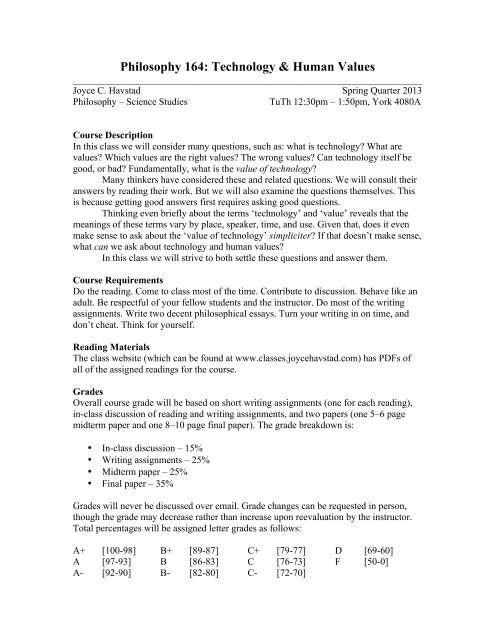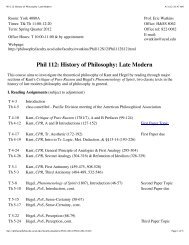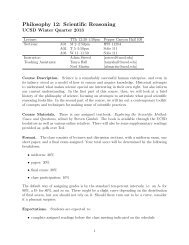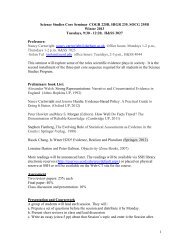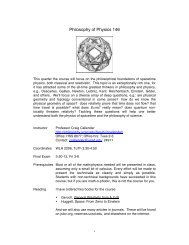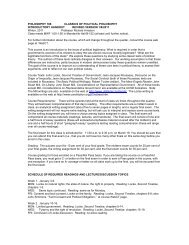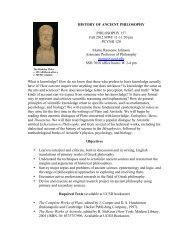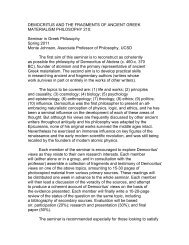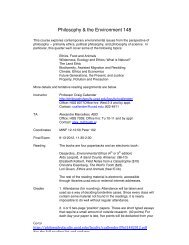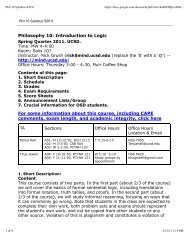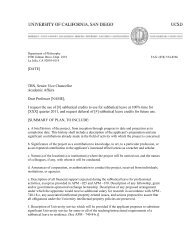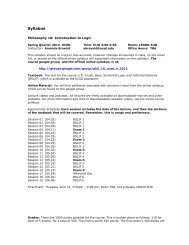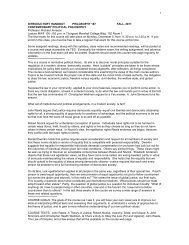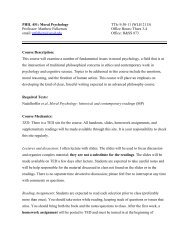Technology and Human Values - UCSD Department of Philosophy
Technology and Human Values - UCSD Department of Philosophy
Technology and Human Values - UCSD Department of Philosophy
You also want an ePaper? Increase the reach of your titles
YUMPU automatically turns print PDFs into web optimized ePapers that Google loves.
<strong>Philosophy</strong> 164: <strong>Technology</strong> & <strong>Human</strong> <strong>Values</strong>________________________________________________________________________Joyce C. Havstad Spring Quarter 2013<strong>Philosophy</strong> – Science StudiesTuTh 12:30pm – 1:50pm, York 4080ACourse DescriptionIn this class we will consider many questions, such as: what is technology? What arevalues? Which values are the right values? The wrong values? Can technology itself begood, or bad? Fundamentally, what is the value <strong>of</strong> technology?Many thinkers have considered these <strong>and</strong> related questions. We will consult theiranswers by reading their work. But we will also examine the questions themselves. Thisis because getting good answers first requires asking good questions.Thinking even briefly about the terms ‘technology’ <strong>and</strong> ‘value’ reveals that themeanings <strong>of</strong> these terms vary by place, speaker, time, <strong>and</strong> use. Given that, does it evenmake sense to ask about the ‘value <strong>of</strong> technology’ simpliciter? If that doesn’t make sense,what can we ask about technology <strong>and</strong> human values?In this class we will strive to both settle these questions <strong>and</strong> answer them.Course RequirementsDo the reading. Come to class most <strong>of</strong> the time. Contribute to discussion. Behave like anadult. Be respectful <strong>of</strong> your fellow students <strong>and</strong> the instructor. Do most <strong>of</strong> the writingassignments. Write two decent philosophical essays. Turn your writing in on time, <strong>and</strong>don’t cheat. Think for yourself.Reading MaterialsThe class website (which can be found at www.classes.joycehavstad.com) has PDFs <strong>of</strong>all <strong>of</strong> the assigned readings for the course.GradesOverall course grade will be based on short writing assignments (one for each reading),in-class discussion <strong>of</strong> reading <strong>and</strong> writing assignments, <strong>and</strong> two papers (one 5–6 pagemidterm paper <strong>and</strong> one 8–10 page final paper). The grade breakdown is:• In-class discussion – 15%• Writing assignments – 25%• Midterm paper – 25%• Final paper – 35%Grades will never be discussed over email. Grade changes can be requested in person,though the grade may decrease rather than increase upon reevaluation by the instructor.Total percentages will be assigned letter grades as follows:A+ [100-98] B+ [89-87] C+ [79-77] D [69-60]A [97-93] B [86-83] C [76-73] F [50-0]A- [92-90] B- [82-80] C- [72-70]
Writing AssignmentsOn most days <strong>of</strong> class we will discuss a piece <strong>of</strong> writing, which must be read beforeh<strong>and</strong>.Your daily writing assignment is to succinctly but insightfully summarize the reading.These summaries should be typed, no less than one paragraph <strong>and</strong> no more than one pagein length. They should conclude with a question you have after doing the reading <strong>and</strong>considering its implications.To receive credit for any given assignment, you must bring two copies <strong>of</strong> it toclass. One copy must be turned in, by you, to the instructor during the first five minutes<strong>of</strong> class. You must be prepared to discuss your summary during class, <strong>and</strong> you can usethe other, second copy <strong>of</strong> your summary for notes <strong>and</strong> reference during that discussion.To receive credit for the writing assignment portion (25%) <strong>of</strong> your overall gradein the class, you must complete at least 16 <strong>of</strong> the 18 writing assignments. So, you canskip at least two assignments with absolutely no penalties. If you miss any more thanthat you seriously risk failing the class. But as long as you turn in, on time, at least 16writing assignments <strong>of</strong> satisfactory quality over the course <strong>of</strong> the quarter, you will receivethis 25% <strong>of</strong> your overall grade.Late assignments will only be accepted in person <strong>and</strong> accompanied by <strong>of</strong>ficialdocumentation (such as a signed doctor’s note or a letter from a licensed funeral home,for example).In-Class DiscussionYou should be prepared to participate during class discussion by sharing your writtensummaries <strong>of</strong> <strong>and</strong> questions about the reading assignments. On any given day for whichyou complete a writing assignment, you may be called on to present your summary <strong>and</strong>discuss your question.Particularly excellent in-class contributions to discussion can earn you up to athird <strong>of</strong> your participation grade (in other words, 5% <strong>of</strong> the relevant 15%). Less favorablecontributions can, however, reduce your participation grade. And in the unfortunate case<strong>of</strong> particularly <strong>of</strong>fensive or inappropriate behavior, there is no limit to the amount bywhich your overall grade might be reduced as a result <strong>of</strong> such behavior.Student ConductBasically regular attendance <strong>and</strong> approximate punctuality are somewhat required due tothe almost daily writing assignments. More importantly, considerate <strong>and</strong> appropriatebehavior during lecture is expected at all times, as is possession <strong>and</strong> display <strong>of</strong> an attitude<strong>of</strong> respect towards other students in addition to the instructor.This means not talking or interrupting while other students or the instructor isspeaking. It also means listening carefully <strong>and</strong> responding to the contributions made bythose in class with you, giving everyone the chance to contribute <strong>and</strong> assessing thosecontributions as charitably as possibly. And it means no texting, taking calls, or otherwiseengaging with social media during class.In fact, no electronic devices are to be used at all during class (unless you havespecial dispensation from, for example, the Office for Students with Disabilities). Thisincludes laptops.Students with athletic, religious, or other critical obligations must inform theinstructor within the first week <strong>of</strong> class <strong>of</strong> any anticipated conflicts, in order to plan2
accordingly. Emergencies will be always accommodated as long as appropriatedocumentation can be provided.Again, late assignments will not be accepted without <strong>of</strong>ficial documentation. Latepapers submitted without such documentation will be graded on half the normal scale,<strong>and</strong> no credit will be given for anything submitted after the assigned date <strong>of</strong> the finalexam time slot.Finally, class participation <strong>and</strong> open-mindedness are encouraged, but cheating <strong>and</strong>plagiarism are strictly forbidden.PlagiarismYou must complete the course assignments yourself—all submitted work should containyour ideas <strong>and</strong> be expressed in your own words. Any other sources used or quoted mustbe cited. Failure to cite sources is a violation <strong>of</strong> the University’s Policy on Integrity <strong>of</strong>Scholarship (see http://students.ucsd.edu/academics/academic-integrity/policy.html),which all students must observe at all times.This policy prohibits academic misconduct, “broadly defined as any prohibited<strong>and</strong> dishonest means to receive course credit, a higher grade, or avoid a lower grade.” Itis your responsibility to know the terms <strong>of</strong> this policy <strong>and</strong> to abide by it. In the case <strong>of</strong>any failures to observe the policy, all forms <strong>of</strong> academic misconduct will be immediatelyreported to the Academic Integrity Office.PapersTwo philosophical essays will comprise 60% <strong>of</strong> your overall grade. The first is shorter(5–6 pages), worth slightly less (25%), <strong>and</strong> will be based on the readings <strong>and</strong> discussionfrom the first few weeks <strong>of</strong> class. The second will be longer (8–10 pages), worth slightlymore (35%), <strong>and</strong> should draw more from later material in the course.You will get your paper assignments two weeks before the papers are due. Bothpapers must by typed <strong>and</strong> turned in on time. And as noted above, you must write thesepapers yourself. But you are welcome to ask for as much help as you need from theinstructor during class <strong>and</strong> especially <strong>of</strong>fice hours.Office HoursTuesdays 2:00pm – 4:00pm in H&SS 7055; or by appointment, made in person <strong>and</strong> kept.Contact InformationThe instructor is available during class <strong>and</strong> <strong>of</strong>fice hours. Emails will only be responded toin case <strong>of</strong> emergency.DisabilitiesDuring the first week <strong>of</strong> class, students requesting accommodations <strong>and</strong> services due to adisability for this course need to provide a current Authorization For Accommodation(AFA) letter issued by the Office for Students with Disabilities (OSD), prior to eligibilityfor requests. Receipt <strong>of</strong> AFAs in advance is necessary for appropriate planning for theprovision <strong>of</strong> reasonable accommodations. OSD Academic Liaisons also need to receivecurrent AFA letters.For additional information, please contact OSD (http://disabilities.ucsd.edu).3
– COURSE CALENDAR –Week 1Tuesday April 2• Syllabus & IntroductionsThursday April 4• Mesthene’s “The Role <strong>of</strong> <strong>Technology</strong> in Society” (1969)Week 2Tuesday April 9• McDermott’s “<strong>Technology</strong>: The Opiate <strong>of</strong> the Intellectuals” (1969)Thursday April 11• Tiles & Oberdiek’s “Conflicting Visions <strong>of</strong> <strong>Technology</strong>” (1995)Week 3Tuesday April 16• Winner’s “Do Artifacts Have Politics?” (1986)• MIDTERM PAPERS ASSIGNEDThursday April 18• NO CLASSWeek 4Tuesday April 23• Park’s “Perpetuum Mobile: In Which People Dream <strong>of</strong> Infinite Free Energy”(2000)Thursday April 25• Oppenheimer’s “Speech to the Association <strong>of</strong> Los Alamos Scientists” (1945)Week 5Tuesday April 30• Shelley’s Frankenstein (1818)• MIDTERM PAPERS DUEThursday May 2• Callicott’s “Intrinsic Value in Nature: A Metaethical Analysis” (1995)Week 6Tuesday May 7• Rolston’s “Naturalizing <strong>Values</strong>” (1998)Thursday May 9• Douglas’ “Inductive Risk <strong>and</strong> <strong>Values</strong> in Science” (2000)Week 7Tuesday May 14• Holl<strong>and</strong>er’s “Institutionalizing Public Service Science: Its Perils <strong>and</strong> Promise”(1984)4
Thursday May 16• Anderson’s “Uses <strong>of</strong> Value Judgments in Science: A General Argument, withLessons from a Case Study <strong>of</strong> Feminist Research on Divorce” (2004)Week 8Tuesday May 21• Sag<strong>of</strong>f’s “At the Shrine <strong>of</strong> Our Lady <strong>of</strong> Fatima, or Why Political Questions AreNot All Economic” (1981)Thursday May 23• Schmidtz’ “A Place for Cost-Benefit Analysis” (2001)Week 9Tuesday May 28• Collins & Pinch’s “Tidings <strong>of</strong> Comfort <strong>and</strong> Joy: Seven Wise Men <strong>and</strong> the Science<strong>of</strong> Economics” (1998)• FINAL PAPERS ASSIGNEDThursday May 30• Collins & Pinch’s “The Hole in the Heart <strong>of</strong> Medicine: The Placebo Effect”(2005)Week 10Tuesday June 4• Parfit’s “Energy Policy <strong>and</strong> the Further Future: The Identity Problem” (1983)Thursday June 6• Gjerris’ “This Is Not a Hammer: On Ethics <strong>and</strong> <strong>Technology</strong>” (2009)Finals WeekMonday, June 10• FINAL PAPERS DUE (11:30am – 2:29pm, location TBA)5


